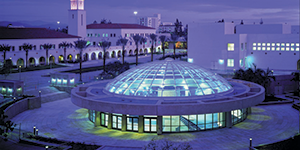Accountancy
Working successfully in today's organizations means working as part of a team – a team of diverse, forward-thinking individuals constantly striving to deliver fully integrated client solutions in an atmosphere of continuous learning.
In the Charles W. Lamden School of Accountancy, we prepare students for a lifetime of continuous, self-directed learning. Whether they choose public accounting or accounting positions leading to financial management in business or industry, they are well prepared for the real world. Our faculty enjoys a national reputation for its innovations in accounting education and its contribution to the body of knowledge in accounting, auditing, and taxation.
Immersion in Accounting Education
Generally, a student's experience is a totally new experience in education. They learn both individual responsibility and the excitement of teaming together to accomplish challenging objectives. The level and volume of work is not trivial. Students are challenged by the integration of technical content and the development of expanded skills and competencies that are integral to success in business. We expect our students' best effort and they grow to expect no less of themselves.
Accounting Curriculum
Complete with a grade of C (2.0) or better:
- ACCTG 201: Financial Accounting
- ACCTG 202: Managerial Accounting
- ECON 101: Principles of Economics (Macro)
- ECON 102: Principles of Economics (Micro)
- FIN 240: Legal Environment of Business
- MIS 180: Principles of Information Systems
- MATH 120 or MATH 150: Calculus for Business Analysis
- STAT 119 or ECON 201: Elementary Statistics for Business or Statistical Methods
You must have a 2.0 average or better in the courses listed below in order to graduate. Other requirements for the degree can be found in the SDSU Catalog and in your degree evaluation. Official requirements are based upon catalog copy and issued by the Office of the Registrar
- BA 300: Ethical Decision Making in Business (1-unit)
- BA 310: Foundations of Business in a Global
Environment (1-unit) - MIS 301: Statistical Analysis for Business
Prereq. MIS 180; MATH 120; STAT 119 or ECON 201 - BA 323: Fundamentals of Finance
Prereq. Credit or concurrent registration in BA 310 - BA 350: Management & Organizational Behavior
Prereq. Credit or concurrent registration in BA 310 - BA 360: Introduction to Operations & Supply Chain
Prereq. STAT 119 or ECON 201; recommended: MATH 120;
Credit or concurrent registration in BA 310 - BA 370: Marketing
Prereq. Credit or concurrent registration in BA 310 - MGT 405: Strategic Management OR MIS 315, 380, 383, 460, 515
MGT 405 Prereq.BA 310, 350 & 370
- ACCTG 331: Intermediate Accounting I
Minimum grade of C in ACCTG 201 and 202; Credit or concurrent registration in BA 310* (refer to the catalog for additional prerequisites listed) - ACCTG 332: Federal Income Taxation
Minimum grade of C in ACCTG 331 - ACCTG 333: Accounting Information Systems
Minimum grade of C in ACCTG 331 - ACCTG 334: Intermediate Accounting II
Minimum grade of C in ACCTG 331 - ACCTG 431: Auditing
Minimum grade of C in ACCTG 333 and credit in ACCTG 390W - ACCTG 432: Cost Management
BA 323; minimum grade of C in ACCTG 331
6 Units of Upper Division Accounting Electives (not including ACCTG 325 or 326)
We strongly recommend that you take ACCTG 390W if you are required to satisfy the Graduation Writing Assessment Requirement (GWAR).
Current Students: Requirements may vary based upon catalog year. For year-specific information, pleas visit:
BMACC (Accountancy BSBA/MS)
Before you apply for the BMACC program, please be advised that this program is unique. It is a combined BS/MS program, and students must successfully complete 150 units to be awarded simultaneously, the B.S. degree in business administration (accounting) and then the M.S. degree in accountancy. Students must apply and be admitted to the BS/MS (4+1) program (BMACC). For more information about the BMACC program, please contact the Center for Student Success.
Get In Touch
Follow our Social Media @SDSUFowler
Take the Next Step
Ready to jumpstart your career? Apply now! Or, if you have any questions about the program, contact us via the Request Info button.



